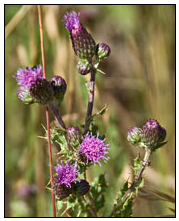|
|
|
Landowners can apply for funds to combat weeds |
|
March 26, 2016 |
 As
you look out over your acres this spring, are
you nervous you might see too much tansy, Canada
thistle, and other noxious weeds? As
you look out over your acres this spring, are
you nervous you might see too much tansy, Canada
thistle, and other noxious weeds?
New Boundary County Weed Superintendent Dave
Wenk is announcing a program for landowners to
control noxious weeds on their property. The
program, called Neighborhood Cooperative Weed
Control, has $11,000 available for landowners to
use to knock out those weeds.
Boundary County is a member of the Selkirk
Cooperative Weed Management Association (SCWMA),
which is a collaborative of government and
private agencies, including, along with Boundary
County, Bonner County, the Idaho Department of
Lands, Idaho Fish and Game, U.S. Fish and
Wildlife, the Kootenai Tribe of Idaho, the
Nature Conservatory, the Idaho Department of
Transportation, the City of Sandpoint, and the
U.S. Forest Service.
The $11,000 available for the Neighborhood
Cooperative Weed Control program comes from the
Idaho Department of Agriculture by way of the
SCWMA.
"The goal is to have property owners control as
many acres as possible of noxious and invasive
weeds on their property by providing funds to
help accomplish this," said Mr. Wenk.
To be eligible for this program, an applicant
must be a property owner in Boundary County and
have noxious or invasive weeds on their
property. The weeds must be included on the
Idaho Noxious Weed List, which contains 67
weeds. Common weeds on the list are Knapweed,
Common Tansy, Oxeye Daisy, Dalmatian Toadflax,
Yellow Toad flax, Canada Thistle, Orange and
Yellow Hawkweed among others. A complete list is
available on the Boundary County Website under
Weed Control or at
Idahoweedawareness.com.
Application forms are available at the
University of Idaho Extension Office behind the
courthouse. Applications are due by March 31,
2016.
Property owners may apply individually or as a
group. When the application form is completed,
the Weed Superintendent will visit the property
to check that noxious weeds are present. If the
applicant is accepted into this program, the
work begins.
"The landowner then purchases the chemicals to
control, and sprays the weeds. Typically
landowners spray the weeds themselves. Labor
costs are not reimbursed," said Mr. Wenk.
The weed superintendent later visits the
property again to make sure the herbicide
application was done and was successful. The
landowner turns in their receipts for the
herbicides, and the county will issue a check to
the landowner.
"Chemicals purchased must be a selective type to
control the weeds and not a general 'Kill -all'
like glyphosate," said Mr. Wenk, who added he is
available to make recommendations of herbicides
to control the weeds.
"Landowners may receive up to $500 for herbicide
purchases," he continued.
Dave Wenk has been Boundary County Weed
Superintendent since January 1, hired to replace
Terry "Duke" Guthrie, who served for many years
as Weed Superintendent and who retired last
December 31, 2015. "With great sadness "Duke"
passed away the day he retired," said Mr. Wenk.
"He was well liked in the community and will be
greatly missed."
Mr. Wenk has a background in the nursery
industry, and brings his expertise and training
to the Department.
"I have a bachelor of science degree in Urban
Forestry. I was a long time applicator in
Indiana before moving to Naples seven years ago.
"I'm looking forward to meeting many people in
this great community and offer my assistance to
our community. I may be reached at
dwenk@boundarycounty.org or at 267-5341.
|
|
|
|
Questions or comments about this
article?
Click here to e-mail! |
|
|
|
|

